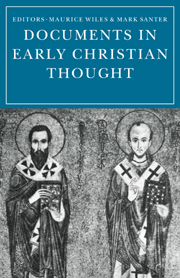2 - TRINITY
Published online by Cambridge University Press: 17 August 2009
Summary
The Christian understanding of God involved not only the integration of anthropomorphism and mystery as illustrated in our first section. There was also the need to combine belief in the unity of God with the ascription of divinity to Christ, and also to the Holy Spirit.
The first passage is part of the transcript of a discussion between Origen and a bishop, Heraclides, whose orthodoxy had been called in question. Its discussion form helps to illustrate the nature of the problem as it was experienced not only by a sophisticated theologian but also by an ordinary bishop. We cannot be certain where or when the discussion took place; it is most likely that it was in Arabia towards the end of Origen's life (c. a.d. 244–9). The account is part of a papyrus found in Egypt in 1941.
The issue came to a head in the fourth century with the outbreak of the Arian controversy. Our second extract shows Athanasius dealing with one particular Arian argument – namely that the concept of God as the one unoriginated source of all being rules out the possibility of ascribing full divinity to the Word or Son.
But more was needed than simply to show that the full divinity of the Son was not an absurd concept. The Church needed to develop a positive way of understanding that divinity in relation to her continuing conviction of the unity of God.
- Type
- Chapter
- Information
- Documents in Early Christian Thought , pp. 22 - 42Publisher: Cambridge University PressPrint publication year: 1975



